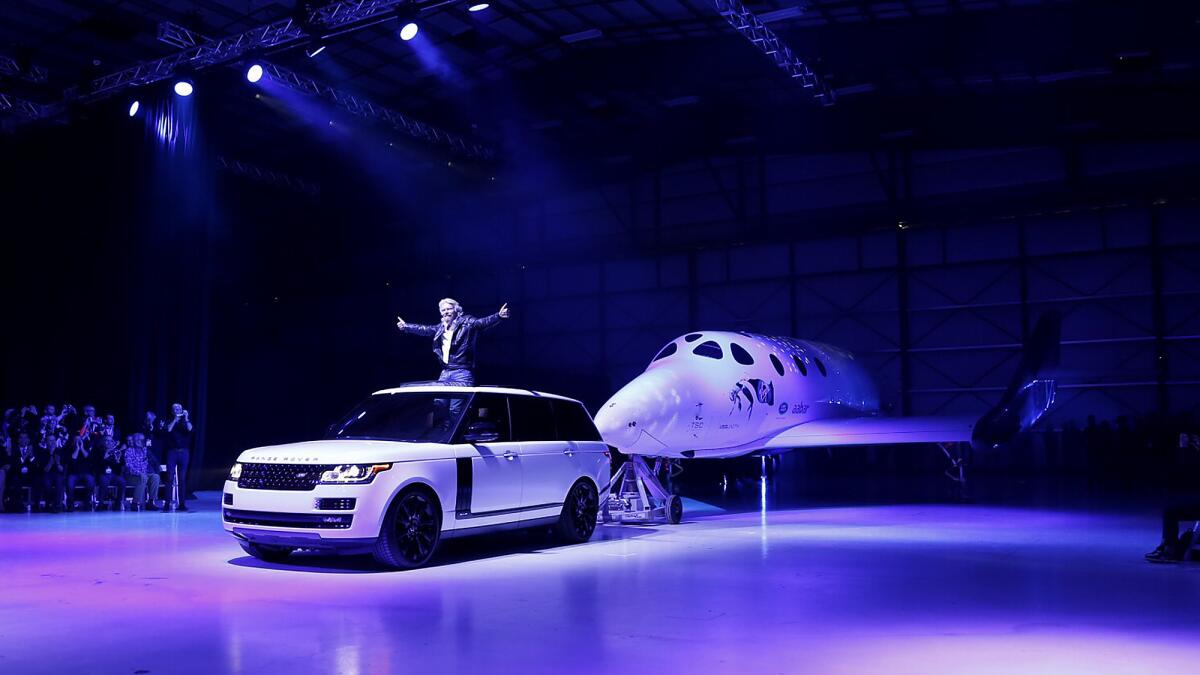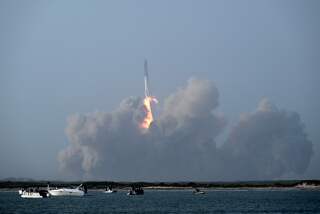Virgin Galactic unveils its new SpaceShipTwo

Richard Branson stands in an SUV as it tows the new Virgin Galactic SpaceShipTwo, named VSS Unity, at an unveiling event at the Mojave Air and Space Port Friday. The new vehicle replaces the company’s previous SpaceShipTwo, which broke apart in midair nearly 16 months ago, killing one of two pilots.
- Share via
Billionaire Richard Branson stepped back into the space race Friday as he unveiled Virgin Galactic’s new SpaceShipTwo with his usual showmanship — and a bit of poignancy.
While music swelled in a hanger at the Mojave Air and Space Port, Branson stood through the sunroof of a white Range Rover. From behind a curtain, the vehicle slowly pulled the replacement for the rocket ship that broke apart in midair above the Mojave Desert nearly 16 months ago, killing one of two pilots.
After the spaceship came fully into view, Branson stood at a podium and faced the crowd.
“All of us in this room need to pinch ourselves,” he said. “It’s almost too good to be true.”
The sleek new spaceship resembled its older sister in its futuristic design. The craft, mostly white with a darker back section, was promptly named Unity by Stephen Hawking in a voice message played at the event.
Hawking said that his ultimate ambition was to go to space, and that Branson had offered him a seat aboard a Virgin Galactic flight.
“If I’m able to go and if Richard will still take me, I will be very proud to fly on this spaceship,” Hawking said in the recording.
This SpaceShipTwo is the first to be built by the Spaceship Co., Virgin Galactic’s manufacturing arm. This version was created by building upon the test data and design from its predecessor, and is “pretty close” to being ready to test, said Doug Shane, president of the Spaceship Co.
“What we aim to do is something that has never been done before,” said George Whitesides, chief executive of Virgin Galactic and the Spaceship Co. “We’re opening space to people in all walks of life. We think it’s time for all of humanity to get out and experience it.”
Virgin Galactic said SpaceShipTwo has already begun a “rigorous test campaign” of the rocket plane’s parts and components, including putting a spaceship cabin through flight pressure simulations and nearly 100 full-scale tests of the rocket motor system. The company said it is now entering a phase where it will test the spaceship as a whole, including its electrical systems and “moving parts.”
“Our commitment to safety can be measured in our commitment to testing,” said Mike Moses, senior vice president of operations at Virgin Galactic. “We have tested thousands of elements of this spaceship, and we will be testing thousands more.”
Virgin Galactic said it will then progress to flights where SpaceShipTwo will stay attached to its mother ship, WhiteKnightTwo, and then glide testing, where the rocket plane will fly freely.
Finally, SpaceShipTwo will go through rocket-powered test flights, which will be key for establishing confidence in the program, said Marco Caceres, senior space analyst at the Teal Group, an aerospace and defense research group.
“That’s what’s going to give them credibility,” he said. “Now [Branson] doesn’t just have the hurdle to convince people it is safe. Now he needs to convince them it’s really super safe.”
The company would not give a timeline for when the test flights might begin.
“What’s clear is we’re not going to be flying the vehicle on Saturday,” Whitesides said. “But this is a really big deal for the team that has made it through a tough time and is now really excited for the future.”
Many potential space tourists attended the unveiling Friday, including Inami Noriaki, 39. The engineer from Tokyo paid $250,000 to reserve a spot 10 years ago on one of the future Virgin Galactic flights, and said the new spaceship was nicely designed.
“Finally, I can go to space, I feel,” he said. “I want to see the Earth and space with my own eyes.”
In July, the National Transportation Safety Board said that the previous SpaceShipTwo broke apart because the copilot had opened the spaceship’s movable tail, or “feather system,” too early. The system is intended to help the plane slow down after its descent from the Earth’s atmosphere.
The NTSB placed most of the blame on the plane’s builder, Mojave-based Scaled Composites, which is owned Northrop Grumman Corp. The agency said the plane’s design should have protected against the possibility of this human error.
The NTSB also faulted the Federal Aviation Administration for not realizing this gap in Scaled’s hazard analysis.
After the crash, Virgin Galactic took over the design and construction of the new SpaceShipTwo and said it devised a mechanism to prevent the feather system from being opened prematurely.
Company executives didn’t shy away from the deadly crash, referring to it and the pilots multiple times during the ceremony. During his speech, Whitesides recalled the days after the mishap when he entered the hangar, thinking about the future of the company.
“We would always remember the accident,” he said. “But we would not be defined by it.”
Friday’s rollout gave Virgin Galactic a chance to re-establish itself as a major player in the space tourism market. During Virgin Galactic’s regrouping, competitors such as Hawthorne-based SpaceX and new rival Blue Origin, owned by Amazon.com Inc.’s Chief Executive Jeff Bezos, have made strides in reusable rocket technology.
In November, Blue Origin blasted its New Shepard vehicle into space, hit a planned altitude of 329,839 feet and then touched down at its launch site in Texas, making Bezos’ company the first to successfully land a rocket. Reusable rocket technology is widely seen as a way to reduce the cost of space travel.
In December, SpaceX blasted 11 satellites into orbit and its first-stage booster rocket touched down on a concrete pad in Florida’s Cape Canaveral. A month later, the company tried to land its Falcon 9 rocket on a drone ship about 200 miles off the California coast, but the rocket stage had a “hard landing” and broke one of its stabilizer legs intended to keep it upright.
“It’s an opportunity to say, ‘We’re still around, we’re not going away, and we’re still committed,’” said Caceres of the Virgin Galactic rollout. “The advantage Branson has is he’s still the most identified with space tourism, but he’s not alone anymore.”
For more business news, follow Samantha Masunaga on Twitter: @smasunaga.
MORE FROM BUSINESS
Apple-FBI battle over San Bernardino terror attack investigation: All the details
California foreclosure-relief program to get hundreds of millions in new funding
Feds strike back at Apple, say firm misleads in public battle over terrorist’s iPhone
More to Read
Inside the business of entertainment
The Wide Shot brings you news, analysis and insights on everything from streaming wars to production — and what it all means for the future.
You may occasionally receive promotional content from the Los Angeles Times.











